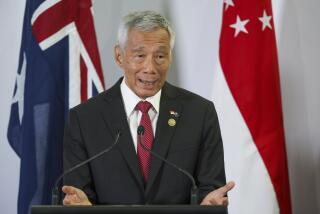Singapore’s New Leader Has Pro-Labor Past
- Share via
SINGAPORE — Ong Teng Cheong, who will be sworn in Wednesday as Singapore’s first elected president, began his career as a private architect but eventually became the island nation’s top labor leader and deputy prime minister.
Ong was elected Saturday, taking 59% of the valid votes, a lower percentage than many expected in his race against former banker and onetime Accountant General Chua Kim Yeow.
Ong, 57, joined the civil service as a town planner, but his first love has been trade unionism. While widely respected for his pro-labor stance, he displayed little of the aggressiveness and soapbox oratory associated with many Asian labor leaders.
“He is soft-spoken, unassuming and mild-mannered, but he is no pushover,” an associate of Ong said. “Ong never hesitated to speak out loud and clear on controversial issues like raising the retirement age of workers, for instance.”
Lawrence Sia, deputy secretary general of the National Trades Union Congress (NTUC), Singapore’s federal trade union, said: “Ong will not mince his words if he thinks there is a good case to speak out.”
Some independent analysts also say Ong is willing to take strong stands despite Singapore’s reputation as a place where political dissent is frowned upon.
Ong, the NTUC chief since 1972, was asked by the pro-government union group to seek the presidency.
Until recently, he was chairman of the ruling People’s Action Party, a post he gave up before the election. Chua appeared to gain mileage in the campaign by suggesting that an Ong victory would effectively increase the ruling party’s dominance of the government.
But Ong repeatedly said his political past would not prevent him from acting independently if necessary.
Ong replaces Wee Kim Wee, elected by Parliament in 1985 to what was then largely a ceremonial post. Singapore amended its constitution in January, 1991, to change that, opting for a presidency with power to veto key Cabinet decisions.
Opposition parties opposed the change, saying a powerful president could curtail Parliament’s authority.
Educated at the Chinese High School in Singapore, Ong received his bachelor of architecture degree from the University of Adelaide, Australia, and later a master of civic design from the University of Liverpool in Britain.
After working as a private architect, he joined the government as an architect and town planner before entering politics in 1972. Since 1975, Ong has served as a minister in the communications, labor and culture ministries. He was appointed deputy prime minister in 1985.
There is some concern about Ong’s health. Last year, he was diagnosed as having low-grade malignant lymphoma, but associates say the illness is under control and has not affected his work.
More to Read
Sign up for Essential California
The most important California stories and recommendations in your inbox every morning.
You may occasionally receive promotional content from the Los Angeles Times.













